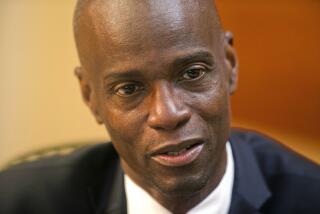14 Convicted of Murdering Grenada Leader, 10 Others
- Share via
ST. GEORGE'S, Grenada — Fourteen people were convicted of murder Thursday and sentenced to hang for killing Prime Minister Maurice Bishop and 10 supporters in a coup that prompted the U.S.-led invasion of Grenada in 1983.
Among the 14 were the former deputy prime minister and his wife. Three other defendants were found guilty of a lesser charge of manslaughter and sentenced to prison terms ranging from 30 to 45 years, and one was acquitted of all charges.
The 12-member jury in the seven-month trial delivered the verdict after the minimum three hours of deliberation. Acting Chief Justice Denis Byron delivered the sentences to the hushed courtroom, which was packed with more than 100 spectators.
All 18 defendants had pleaded innocent in the killings of Bishop and 10 followers on Oct. 19, 1983, during a coup by a radical faction of the prime minister’s leftist New Jewel Movement.
The United States, coordinating troops and police from Jamaica, Dominica, St. Lucia, Antigua, St. Vincent and Barbados, invaded the eastern Caribbean island six days later and ousted the coup leaders.
At the time, President Reagan said the goal of the invasion was to rescue American students at at the St. George’s College of Medicine and restore democratic institutions. But the United States, already alarmed by Bishop’s Marxist leanings and warm ties with Cuba and the Soviet Union, also wanted to stop a more extreme move to the left by the radical military faction that overthrew Bishop and his government.
The invasion involved more than 5,000 U.S. troops, of whom 1,900 actually landed on Grenadian soil. Nineteen U.S. servicemen were killed and 90 wounded in fierce fighting with Cuban military personnel, the Pentagon said.
Twenty Grenadian police officers stood guard Thursday inside the whitewashed courtroom, and Prime Minister Herbert Blaize, elected in 1984, still thought it prudent to summon police reinforcements from neighboring islands as the day of the verdict approached.
The prosecution said 10 defendants were members of a government central committee that issued orders to kill Bishop and his followers. The murders were carried out by a four-man firing squad led by Lt. Callistus Bernard, the prosecution maintained.
Found guilty were former Deputy Prime Minister Bernard Coard and Hudson Austin, a former general of the now-disbanded People’s Revolutionary Army. Both testified they were close friends of Bishop and had no reason to kill him, but the prosecution portrayed them as leaders of the radical faction.
Also found guilty of murder were central committee members Phyllis Coard, Bernard Coard’s wife; Leon Cornwall, Bishop’s ambassador to Cuba; Selwyn Strachan, minister of mobilization; Lt. Col. Ewart Layne; Cecil Prime; Liam James; John Ventour; Dave Bartholomew, and Kamau McBarnettee.
The soldiers found guilty of murder were Nestor Redhead, Christopher Stroude and Callistus Bernard.
Redhead was said to have slit Bishop’s throat and cut off his ring finger. Hudson-Phillips said the 11 bodies were burned in a makeshift grave at an army camp six miles outside St. George’s that night.
Soldiers Vincent Joseph and Cosmos Richardson were found guilty on 11 counts of manslaughter and each sentenced to 45 years of imprisonment, and Andy Mitchell was found guilty of eight counts of manslaughter and sentenced to 30 years.
Soldier Raeburn Nelson, who wept and expressed remorse over the incident during the trial, was found innocent.
“I feel very happy to be given a chance once again among the Grenadian people,” said Nelson, who became a born-again Christian while imprisoned.
Coard said they were convicted in a “kangaroo court and show trial.” His wife shouted at Judge Byron, “The world will condemn you!”
Layne, who was the army officer of the day when Bishop was killed, said: “My entire life has been dedicated to the revolution. I acted alone.”
The defendants were taken to lunch before the verdict was read and were brought back into the crowded courtroom in handcuffs. The 17 men wore drab clothing, but Coard’s wife wore a bright green dress and her hair was swept back with a green band.
All the defendants had dismissed their attorneys during the trial and represented themselves.
During the trial, prosecutor Karl Hudson-Phillips told the court that a proposal to allow Coard to share power with Bishop prompted the murders.
The leadership of the New Jewel Movement, founded by Bishop before he took power in a 1979 coup, split over the proposal, Hudson-Phillips said. The army finally was sent to kill Bishop, Education Minister Jacqueline Creft, Housing Minister Norris Bain, Foreign Minister Unison Whiteman and seven other people, the prosecutor said.
The prosecution’s star witness was Fabien Gabriel, a soldier given immunity in exchange for his testimony.
Gabriel said he was present with six of the defendants when Bishop and the others were lined up against a wall at Ft. Rupert in downtown St. George’s.
Those convicted Thursday have the right to appeal, but there was no immediate word on whether they plan to do so. The murder charges carry a mandatory penalty of death by hanging.
Grenada has achieved relative political stability since the invasion. Meanwhile, the United States has poured about $85 million into the country, which still relies largely on crops such as nutmeg, bananas and cocoa as well as tourism to support itself.
More to Read
Sign up for Essential California
The most important California stories and recommendations in your inbox every morning.
You may occasionally receive promotional content from the Los Angeles Times.










